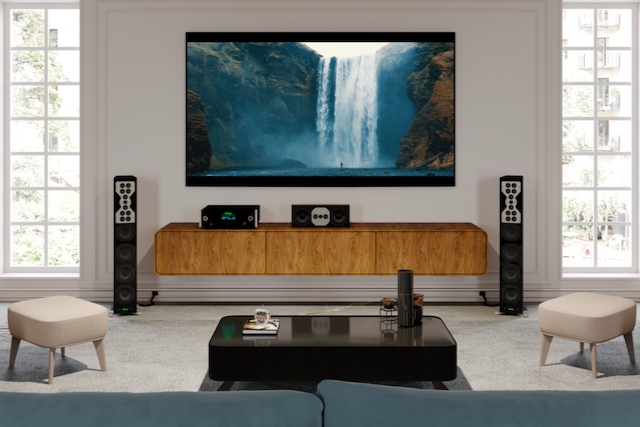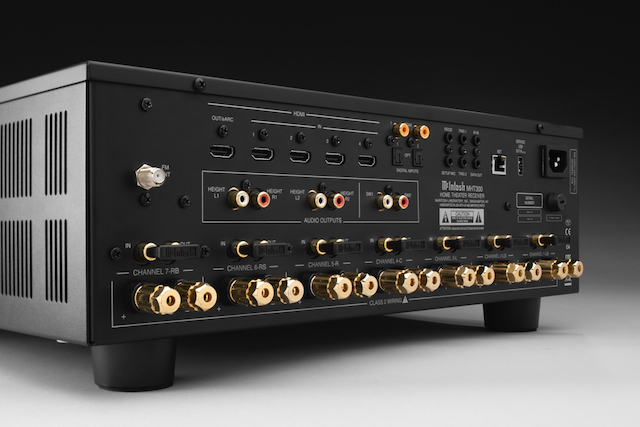New York-based prestige audio brand McIntosh this week launched the MHT300, an $8,000, 7.2-channel home theater receiver that boasts a monstrous 120 watts to 150 watts per channel of power. That’s right: up to 1,050 total watts. But what’s impressive about this is that all that legendary McIntosh power is distributed to all seven channels, making for some serious movie-watching sound from all directions. Well, kinda.

The McIntosh MHT300 Home Theater Receiver will let you hear “every explosion, car chase, and high-speed fighter jet flyby,” according to a press release, at 120 watts per channel into 8-Ohm speakers or 150 watts per channel with 4-Ohm speakers, with all seven channels driven.
And while this setup is sure to deliver pristine McIntosh sound, which may be great for most people, there’s a potentially expensive compromise when it comes to adding the height channels for Dolby Atmos surround sound. By default, those seven powered channels represent the front-left, center, front-right, left surround, right surround, left-rear, and right-rear speakers — there are no amplified height channels, which you need for true Dolby Atmos sound.
If you want those height channels you’ll need to make some tweaks, and it can get expensive. For 5.1.2 (or 5.2.2) sound, you’ll need to use a set of jumper cables to route the height channel signals from the receiver’s non-amplified height channel outputs into two of the seven amplified outputs. McIntosh doesn’t include these jumpers in the box, so you’ll have to find your own. Some tweaking of the receiver’s settings will also have to happen.
If you want to do 7.1.2 or 7.1.4 (or the double-subwoofer versions), you’ll need a separate amplifier for the height channels. For this task, McIntosh recommends its $5,000 MI254 4-channel amplifier.
That’s a big additional investment, but we get it: McIntosh has gone to a lot of trouble to make sure every channel is getting a massive dose of power, and it doesn’t want to water that down for the sake of Atmos height channels. So if you’re someone who wants a full-power Dolby Atmos/DTS:X experience (with those screaming fighter jet flybys at 150 watts per channel), then you should know that it’s going to cost you. But, let’s face it — if you’re moving in the same circles as McIntosh, then you know what you’re getting into.
The MHT300’s power versatility doesn’t even end there — you can also add more power to the system, say to the front-left and right speakers, by connecting external stereo amplifiers to the jumpers of any of the MHT300’s seven channels for a power boost.
On the picture side of things, the MHT300 features 8K/60Hz and 4K/120Hz video for all of its four HDMI 2.0 inputs and one HDMI eARC output, as well as support for Dolby Vision, HDR10+, and HLG formats, meaning you’ll get beautiful images to go along with McIntosh’s big sound.
A home theater system of this magnitude needs to be set up properly, but it seems that McIntosh has thought of that, too, with the MHT300 utilizing Dirac Live Room Correction, a high-end digital processing software that can analyze and optimize sound based on the acoustics in any room.
Additional features of the MHT300 include signal -sensing inputs and auto shutoff when the system is dormant for a set amount of time, McIntosh’s Power Guard signal overload technology that helps prevent overdriving and damaging your speakers, and Sentry Monitor short circuit protection. The MHT300 also features an FM tuner for radio listening and an included remote control.
“Considering the increase in video -treaming services over the last decade, we are excited to share our latest innovation in home theater with our customers for them to better enjoy their entertainment in the comfort of their home,” said McIntosh President Charlie Randall. “We look forward to seeing the positive impact the MHT300 will have on consumers’ at-home viewing and listening experiences.”
The McIntosh MHT300 Home Theater Receiver begins shipping in the U.S. and Canada in March and will retail for $8,000.
Editors’ Recommendations
Credit: Source link





Comments are closed.